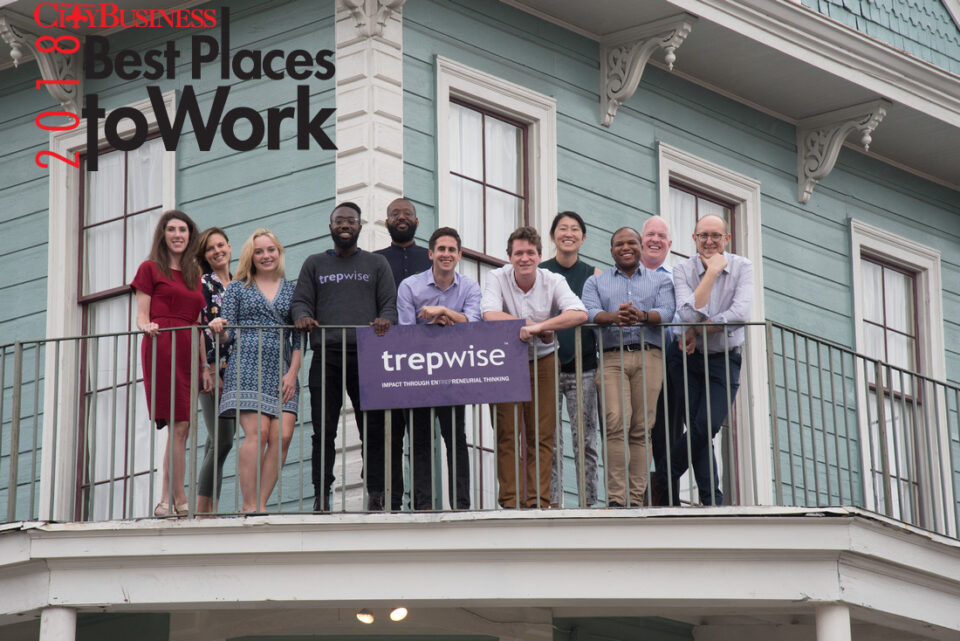Last week New Orleans City Business hosted a luncheon in the Hyatt Regency Ballroom. Spread out across the room were 50+ tables for 50 honorees, split between small businesses and larger companies. Each organization was being honored as one of the Best Places to Work for 2018. trepwise was lucky enough not just to be on the list this year, but actually to win GOLD in the “Small Business” category. I wanted to write about this not (just) to toot our own horn, but to explore a little bit about what it means to be a great place to work, and how this reflects on what work means in 2018.
As a society we are spending an unprecedented amount of time at work. The 40-hour workweek is a thing of the past —over 70% of workers work more than 40 hours a week.[1] Americans work far more than workers in other countries— 137 more hours per year than our Japanese counterparts, 260 more than the British, and 499 more than the French. (City level data on New Orleans doesn’t exist, but I imagine that, true to form, it falls somewhere between France and the United States.)
What’s more, people are increasingly looking for their work to reflect who they are – a recent study said 70% of college graduates say they get a sense of identity from their job rather than it being just what they do.[2] As Annie Dillard once said “As we spend our days, is of course, how we spend our lives.” If we’re going to spend our lives working, it makes sense that we would want these activities to reflect our values.
And yet (or perhaps because of this) some workers are more dissatisfied than ever. 44% of millennials surveyed in a recent survey said they expect to leave their job within 2 years.[3] In a tight job market retaining and attracting talent is the difference between sustained growth and precipitous decline. Below are some of the questions we’re asking ourselves and our clients this holiday season, as reflect on what it means to build a great place to work.
- What’s the Purpose? In the past, we’ve written about building a great company culture and how it all starts with a clear organizational purpose to drive a positive cycle of attracting team members with shared aspirations.
- Are our Incentives Aligned? As you determine office perks, make sure you align those perks with the aforementioned organizational purpose. We’ve written about that as well, highlighting some of the benefits we’ve found to be in line with our values. Aside from pay and benefits, studies suggest that the next most important thing for workers is workplace flexibility. Do your organizational policies communicate that employees are trusted and give them the autonomy that an increasingly younger workforce desires?
- Is there a Sense of Belonging? We all want to be part of something larger than ourselves. A recent Wall Street Journal article argues the following: “What will distinguish the most profitable companies from the rest in the coming year won’t be whether they offer foosball or free food. It will be whether leaders foster a workplace culture where employees feel a sense of belonging, like their jobs and trust their managers to help them move on to a better one.”[4] The importance of belonging and safety is reinforced by an internal Google study on team effectiveness which indicated that “psychological safety, more than anything else, was critical to making teams work.”[5] As physical wellness programs are increasingly adopted by organizations, the next big question is how workplaces can support emotional wellness to ensure team members feel safe and supported.
There is no silver bullet to building a great place to work. Every organization is composed of people – individuals with different needs and desires. The best way to know how to support and retain team members is to ask them. We’ve designed and administered annual culture surveys for a number of clients, and the results never fail to provide valuable insights, and often a surprise or two.
The changing dynamics of workplace culture is one aspect of the “Future of Work”, a topic which we hope to explore further in 2019. We’re interested in how a generational workforce realignment is forcing organizations to re-think their approach to employee retention. We want to delve further into how technology is changing team organization and communication. And we will be exploring how entrepreneurial thinking is being used by business owners and social impact non-profits in cities like New Orleans, far beyond the insulated networks of Silicon Valley, to solve real problems. As we learn about the future of work, we hope to glean insights that can be applied as we strive to make trepwise, our clients and our partners, some of the best places to work. We hope you’ll come along for the ride.
[1] https://20somethingfinance.com/american-hours-worked-productivity-vacation/
[2] https://news.gallup.com/poll/175400/workers-sense-identity-job.aspx
[3] https://www2.deloitte.com/content/dam/Deloitte/global/Documents/About-Deloitte/gx-millenial-survey-2016-exec-summary.pdf
[4] https://www.wsj.com/articles/why-perks-no-longer-cut-it-for-workers-1543846157
[5] https://www.nytimes.com/2016/02/28/magazine/what-google-learned-from-its-quest-to-build-the-perfect-team.html

